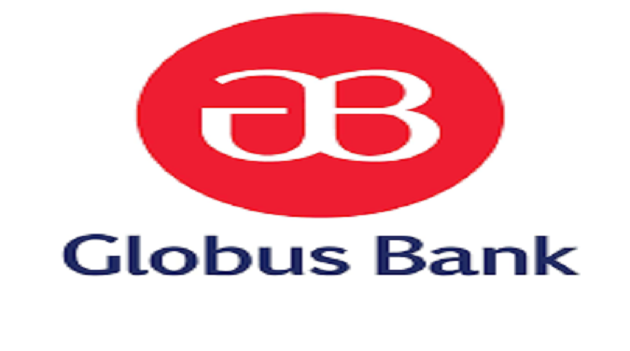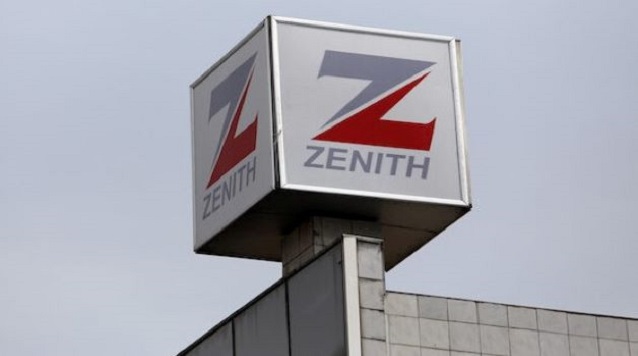E-Financial
Rating Agencies Reaffirm Globus Bank National Credit Rating of A-, Stable Outlook

Globus Bank said Nigeria’s foremost rating agencies, Agusto & Co last month, affirmed its A- rating, describing the bank as “A financial institution of good financial condition and strong capacity to meet its obligations relative to all other issuers in the same country.”

“The rating according to Agusto & Co, reflects the bank’s good profitability, acceptable capitalization ratios, and experienced management team. Agusto & Co further assigned an ESG score of “3” in acknowledgment of the material contribution of Environmental, Social and Governance concerns in the bank’s credit risk and business operations.
“The affirmation of A- captures the bank’s quality financial condition and strong capacity to meet its obligations relative to all other issuers within the country,” the statement added.
Additionally, it said GCR Ratings likewise affirmed Globus Bank Limited’s national scale long and short-term issuer ratings of BBB-(NG) and A3(NG) respectively; with a Stable Outlook.
“The affirmation of the ratings of Globus Bank Limited is based on its well-managed risk, stable funding structure, liquidity profile and growing competitive position. Likewise, the rating signifies Globus bank’s creditworthiness and capacity for timely payment on long and short-term obligations.
“Globus Bank has opened 36 branches across the 6 geopolitical zones of Nigeria within 5 years of operation, making it the fastest organically growing commercial bank in Nigeria. The bank is financially sound with Zero NPL and a balance sheet size of N1.3trillion.
“In line with CBN capitalization policy, the bank has commenced a fresh capital raise of N50bn by way of rights and private placement, which will be concluded by September 2024.
“This will take the bank’s shareholders fund to about N132Billion by the end of 2024 financial year. The bank is very much on course to achieving its minimum capital requirement of N200bn within the period stipulated by the CBN, “the bank said.
E-Financial
Zenith Bank Grows Gross Earnings to N3.4trn on Strong Interest Income

Zenith Bank Plc has reported a 16% year-on-year growth in gross earnings to N3.4 trillion for the nine months ended September 30, 2025, up from N2.9 trillion in the same period of 2024.

The growth, according to the unaudited financial results presented to the Nigerian Exchange (NGX), was driven largely by a sustained rise in interest income and disciplined execution amid a challenging macroeconomic environment.
Interest income surged by 41% to N2.7 trillion, supported by the high-yield interest rate environment and the expansion of the bank’s investment portfolio.
However, interest expenses also increased by 22% to N814 billion, reflecting the impact of tighter monetary policies and a growing funding base.
Despite this, Zenith Bank maintained a healthy net interest margin (NIM) of 12%, up from 10% recorded in September 2024.
Non-interest income declined by 38% to N535 billion, weighed down by a 60% fall in trading gains. Profit before tax fell by 8% to N917 billion from N1 trillion a year earlier, while profit after tax also dipped to N764 billion.
Earnings per share (EPS) stood at N18.60, compared to N26.34 in the same period last year, as the bank intensified efforts to improve its loan book quality.
Total assets grew by 4% to N31 trillion as of September 2025, from N30 trillion in December 2024.
The growth was largely underpinned by an eight percent increase in customer deposits to N23.7 trillion. Gross loans declined by nine percent to N10 trillion, reflecting the bank’s cautious approach to risk, while its non-performing loan (NPL) ratio improved to 3% following strategic write-offs of impaired assets.
Zenith Bank PLC maintained strong profitability ratios, with return on average equity (ROAE) at 23.3% and return on average assets (ROAA) at 3.3%.
The cost of funds rose to 4.5% in line with elevated market rates, while the cost-to-income ratio increased to 45%. The bank’s coverage ratio and liquidity ratio remained robust at 211.1% and 53%, respectively, well above regulatory thresholds.
Commenting on the results, Adaora Umeoji, Group Managing Director/CEO, attributed the performance to the bank’s resilience and adaptive strategy.
“The Bank’s robust performance is an attestation to the resilience of the Zenith brand, the result-driven strategy, and the adaptability of our people in an evolving operating environment.
“We have fortified our capital base, reset our asset quality, and are well-positioned for sustainable and profitable growth,” she said.
Looking ahead to the fourth quarter, Umeoji expressed confidence in the bank’s growth trajectory.
“This result confirms the resilience of both our business model and our people. Our focus on innovation, digital transformation, and developing solutions that address our clients’ changing needs positions us to capitalise on emerging opportunities whilst maintaining our disciplined approach to growth,” she said.
Zenith Bank’s consistent performance and governance standards have continued to attract industry recognition.
The bank was ranked number one in Nigeria by Tier-1 Capital for the 16th consecutive year in The Banker’s 2025 Top 1000 World Banks Ranking and named Nigeria’s Best Bank at the Euromoney Awards for Excellence 2025.
It has also won multiple awards, including Bank of the Year (Nigeria) by The Banker in 2020, 2022, and 2024; Best Commercial Bank, Nigeria, by World Finance for five consecutive years (2021–2025); and Most Sustainable Bank, Nigeria, by International Banker in 2023 and 2024.
E-Financial
Tinubu’s 15% Fuel Duty: Taxing Pain in a Broken Economy

By Blaise Udunze
When a nation is bleeding economically, with inflation at historic highs and citizens gasping for survival, one expects government policy to offer relief, not suffocation. Yet, President Bola Ahmed Tinubu’s approval of a 15 per cent import duty on petrol and diesel does the exact opposite for it taxing pain in a broken economy.

According to a presidential letter dated October 21, 2025, and addressed to the Federal Inland Revenue Service (FIRS) and the Nigerian Midstream and Downstream Petroleum Regulatory Authority (NMDPRA), Tinubu directed the immediate implementation of the new import tariff as part of what the government described as a “market responsive import tariff framework.”
Signed by his Private Secretary, Damilotun Aderemi, the memo followed a proposal by the Executive Chairman of the FIRS, Zacch Adedeji, who claimed the measure was part of “ongoing reforms to boost local refining, ensure price stability, and strengthen the naira-based oil economy” in line with the so-called Renewed Hope Agenda.
In theory, it sounds noble with the aim to protect local refineries, promote energy security, and build a self-sustaining oil economy. But in practice, this policy is another dagger in the heart of Nigerians already crushed by the triple burden of fuel inflation, currency collapse, and dwindling purchasing power.
Because let’s face it, you cannot tax your way out of poverty when the people are already too poor to pay for survival.
The New Tariff: A Policy with Pain Written All Over It
Under the directive, importers will now pay a 15 per cent ad-valorem duty on the cost, insurance, and freight (CIF) value of imported petrol and diesel. The government argues that this will “align import costs with domestic market realities” and “protect local producers from unfair pricing.”
But industry data reveal what this truly means at current CIF levels, the new tariff will raise the landing cost of petrol by about N99.72 per litre. In other words, the already painful pump price hovering around N920 per litre in many parts of Nigeria could easily surpass N1,000 per litre within weeks.
This isn’t speculation, it is arithmetic. Depot operators have already sounded the alarm.
“As it is, the price of fuel may go above N1,000 per litre. I don’t know why the government will be adding more to people’s suffering,” one operator lamented in an interview.
Another industry source added, “Some of the importers are working in alignment with Dangote, which is why the last price increase was general. All players raised their prices at once. Without a clear framework to stabilise market forces, this import duty will worsen the hardship faced by consumers.”
So, while the government insists the duty “won’t choke supply or inflate prices beyond sustainable thresholds,” market realities tell a different story. The moment you tax importation of essential energy products in a country that barely refines any petrol domestically, you are effectively taxing the daily lives of millions who depend on that fuel to move, work, and eat.
An Economy Already in Free Fall
Nigeria’s economy today stands on the brink. The naira has lost nearly half its value since mid-2023, driving annual inflation above 34 percent, while food inflation hovers at 40 percent, according to the National Bureau of Statistics (NBS). In one of the world’s largest oil producing nations, fuel prices quintupled, increasing more than 514 percent from N175 in May 2023 to N900, transportation costs have skyrocketed with the “agbuero” extortion compounding issues, small businesses are collapsing, and households are cutting meals to survive.
When fuel prices rise, everything else follows, from food to transportation, rent, and the cost of living. The import duty therefore becomes a multiplier of misery, cascading through the economy in ways the government either underestimates or deliberately ignores.
Manufacturers who depend on diesel to power their factories will pass the extra cost to consumers. Transporters will raise fares. Traders will hike prices. Schools, hospitals, and logistics companies will all adjust their rates upward.
Within a few months, the 15 percent duty will translate into another round of inflationary spiral, deepening poverty and eroding the value of wages even further.
According to the National Bureau of Statistics, over 133 million Nigerians already live-in multidimensional poverty. While the World Bank’s 139 million estimate translates to roughly six in 10 Nigerians living below poverty line. This new tax could easily push millions more into deeper deprivation.
Protecting Local Refineries or Creating a Monopoly?
The government justifies this new tariff as a way to “protect local refineries.” But this explanation exposes the deeper structural danger that Nigeria may be walking straight into a private monopoly in the petroleum sector with Dangote Refinery as the ultimate winner.
While protecting local industry is a legitimate policy goal, doing so without ensuring fair competition is economic suicide. The reality today is that Dangote Refinery dominates the refining landscape both in size and political influence.
Most of the smaller modular refineries in the Niger Delta are struggling to start production due to lack of crude supply, high financing costs, and regulatory uncertainty. The government’s import duty, therefore, does not create a level playing field; it simply tilts the market decisively in favour of Dangote.
If importers are taxed heavily while one giant refinery backed by political access and incentives controls the supply chain, the result is a monopoly, not a free market. And when one player dominates fuel production and pricing in a country of over 200 million people, the economy is at his mercy.
Dangote could dictate wholesale prices, influence market supply, and quietly shape government policy, all under the banner of “local protection.” Already, marketers allege that the last round of price increases was coordinated across the board, hinting at a shadow monopoly forming in plain sight.
This is dangerous for any economy, but for Nigeria where corruption and patronage distort every policy, it is catastrophic.
Energy Security Built on Fragile Foundations
The FIRS memo to the President claimed that the new tariff aims to “strengthen local refining capacity and ensure affordable supply.” But local refining remains largely aspirational.
As of today, Nigeria still imports nearly all its petrol, despite having four state owned refineries that are perpetually moribund. The Dangote Refinery, although a technical marvel, is still struggling to achieve full-scale petrol output and relies on imported crude for much of its operations.
The modular refineries, which were supposed to fill the gap, are barely surviving. Without access to crude oil feedstock often monopolised by larger operators, they cannot compete.
So, who exactly is being protected by this policy?
Certainly not the small modular refineries in Edo, Bayelsa, or Rivers. Not the ordinary Nigerian who will now pay N1,000 for a litre of fuel. Not even the struggling logistics sector, already crippled by high energy costs.
The only entity that benefits is a dominant private player who can withstand the short-term shock and then profit massively once competitors are priced out.
Policy Contradictions and Economic Disconnect
The tragedy of this decision lies not only in its cruelty but in its confusion. The same administration that preaches “ease of doing business” and “market freedom” is imposing tariffs that stifle competition and hurt consumers.
When President Tinubu removed fuel subsidy in May 2023, he promised that “subsidy is gone” and that market forces would drive fair pricing. But over a year later, Nigerians have learned that what replaced subsidy is not a free market but it is a managed monopoly, backed by selective protectionism and opaque pricing.
The contradiction is stark. You cannot remove subsidies on one hand and then impose punitive tariffs on the other. You cannot preach deregulation while protecting a single dominant player.
This isn’t market reform; it is economic confusion disguised as policy innovation.
The Human Cost: Everyday Nigerians Paying the Price
For the ordinary Nigerians, the macroeconomics of import tariffs mean little. What matters is survival.
A family man who spends N2,000 daily on transport now faces N3,000. A small business owner running a diesel generator must now budget twice as much for power. Food vendors, farmers, delivery riders, all are trapped in a cycle of rising costs and shrinking incomes.
Each increase in fuel price is another wound to the working class. And when government justifies it with lofty phrases like “energy security” and “local capacity protection,” it insults the intelligence of citizens who know that their suffering funds elite comfort.
The average Nigerian no longer trusts policy announcements because they have learned that every “reform” means more hardship.
Inflationary Tsunami Ahead
Economic experts have already warned that this new import duty could ignite a fresh wave of inflation. Since transportation is a key cost component in nearly every sector, a 15 percent increase in fuel import costs will ripple through the entire economy.
Analysts at SBM Intelligence estimate that transport fares could rise by another 25–30 percent, while food inflation could easily cross 45 percent by early 2026 if the policy is not reversed.
This isn’t mere speculation. We have been here before. After subsidy removal in 2023, inflation jumped from 22 percent to 34 percent within months. The difference now is that citizens have exhausted their coping mechanisms.
When people can no longer eat, they revolt. The Nigerian state risks pushing its citizens to that breaking point.
Killing Local Competition Before It is Born
Ironically, while the government claims to be “protecting local refining,” this policy will likely kill smaller refineries before they gain traction.
Most modular refineries were financed by private capital at high interest rates. They need steady cash flow and competitive margins to survive. But when the government grants one mega-refinery privileged protection and imposes heavy duties on imports, it destroys the business case for smaller players.
No investor will finance modular refineries if the regulatory environment favours one company. And when competition dies, innovation dies with it.
Nigeria could have built a diversified refining ecosystem, with multiple regional players supplying local markets and driving down costs. Instead, it is creating a single industrial empire whose influence will dwarf even that of the Nigerian National Petroleum Company (NNPC).
That is not industrial policy. It is economic feudalism.
A Mirage of Regional Price Comparisons
The government argues that even with the new tariff, Nigeria’s pump prices would remain below regional averages: N964 per litre compared to Senegal’s $1.76, Côte d’Ivoire’s $1.52, and Ghana’s $1.37.
But this comparison is disingenuous. Those countries have stable power grids, working public transportation, and better social safety nets. Nigerians don’t.
In a nation where fuel directly powers homes, businesses, and schools due to epileptic electricity supply, any increase in fuel price hits far harder. Comparing Nigeria to Senegal or Ghana ignores the structural poverty and infrastructure decay that amplify every price shock.
It is like comparing a man who walks barefoot to another who drives a car and both are on the road, but one feels every stone.
Taxing Misery in the Name of Reform
Policies like this expose the moral blindness of governance in Nigeria. They treat citizens as economic statistics, not human beings.
The government sees fuel as a fiscal problem to be taxed, not a lifeline that millions depend on. It assumes that raising revenue justifies raising suffering.
But no reform can succeed if it crushes the very people it is meant to uplift.
Even from a fiscal standpoint, this duty will not deliver the revenue the government expects. Higher pump prices will reduce demand, encourage smuggling, and fuel black-market trading. The result will be less revenue, more inflation, and higher corruption.
Policy Alternatives That Make Sense
If the goal is truly to strengthen local refining and energy security, there are better, smarter paths to take.
- Provide access to crude oil for modular refineries under transparent, fair terms.
- Offer tax incentives for local refiners, not punitive import tariffs that hurt consumers.
- Encourage competition through regulatory equity, not protectionism.
- Invest in energy infrastructure, including pipelines, storage, and distribution to reduce logistics costs.
- Reform the power sector so that industries are not forced to rely on diesel for survival.
Nigeria doesn’t need more taxes; it needs intelligent policies that balance protection with affordability.
The Politics of Pain
Let’s be clear, this 15 percent duty is as political as it is economic. It serves powerful business interests cloaked in nationalist rhetoric.
Tinubu’s government has consistently framed hardship as “sacrifice” for a better future. But when sacrifice becomes perpetual, it ceases to be patriotic, it becomes exploitation.
The political cost of this decision could be severe. Nigerians who tolerated subsidy removal with the promise of reform may not tolerate another shock that pushes them into darkness.
Already, discontent is growing. Labour unions are preparing for protests, civil society groups are calling for reversal, and the opposition is mobilising public anger.
If unchecked, this could become the defining crisis of the Tinubu presidency as a symbol of reform gone wrong.
The Road Not Taken
There was an opportunity to rebuild Nigeria’s energy sector through inclusive, transparent reforms. The government could have used the subsidy savings to fix refineries, support modular operators, and invest in renewables.
Instead, it has chosen the easy route by taxing more, explaining less, and hoping for miracles.
But the laws of economics are unforgiving. You cannot squeeze revenue from an economy that is shrinking. You cannot build energy security on policies that destroy purchasing power. You cannot claim to protect the poor by enriching monopolies.
A Nation at the Crossroads
President Tinubu’s 15 percent fuel import duty is not just a fiscal measure, it is a moral test of governance.
It asks whether the Nigerian state still sees its people as citizens or merely as consumers to be taxed. Whether “Renewed Hope” means renewed hardship. Whether government policy can still reflect empathy, not elitism.
As petrol edges beyond N1,000 per litre and diesel costs strangle businesses, Nigerians are once again left to bear the consequences of decisions they did not make and cannot afford.
History will judge this administration not by its slogans, but by how it handled the suffering of its people.
And if the story of this fuel duty becomes the story of another failed reform of monopolies masquerading as markets, and citizens sacrificed for profit, then “Renewed Hope” will be remembered not as a promise, but as a warning.
Blaise, a journalist and PR professional writes from Lagos, can be reached via: blaise.udunze@gmail.com
E-Financial
SEC Says Nigerians Have Lost N316Bn to Ponzi Schemes

Securities and Exchange Commission (SEC), has revealed that Nigerians have collectively lost about N316 billion to Ponzi schemes and illegal fund managers over the years.

The commission warned that both greed and ignorance continue to fuel the spread of these fraudulent activities.
AbdulRasheed Dan-Abu, head of FinTech and Innovation Department at the Commission, made this disclosure during a presentation on combating investment fraud at a journalist academy held in Abuja.
The event was organised by the commission to train finance journalists.
Dan-Abu described Ponzi schemes as deceptive investment setups that pay returns to earlier investors using funds contributed by new participants rather than from any legitimate business operations.
“These schemes are not really doing anything. They are just collecting people’s money and using it to pay the initial investors. At some point, when there are no new investors, the whole thing crashes and the operators disappear,” he said.
He attributed the persistence of such frauds to the increasing obsession with fast wealth among Nigerians.
“Everybody just wants to get rich today. That is actually what makes people fall into this trap. Even the people who are greedy now are more educated than those who experienced Charles Ponzi’s first scheme. Education has not stopped greed,” he noted.
Dan-Abu recalled the infamous MMM Nigeria scheme, which lured thousands of citizens with promises of a 30 percent monthly return.
He said that some victims even reinvested after its collapse.
“Even after MMM shut down, they came back and told people that if you pay a certain amount, you will get access to your lost money. People still paid. That shows you how greed blinds people,” he said.
He further recounted another case involving a fraudulent organisation known as New Nation, Women in Oil.
The scheme disguised itself as a government-backed empowerment initiative and ended up trapping 155,000 rural women.
“Many sold their houses and cars to invest because they believed it was real. It tells you how dangerous this thing is when people do not ask questions,” he said.
According to data from the SEC presentation, several investment scams have led to massive losses: investors lost N100 million each in Cow Lane and Durrell Nigeria Ltd; N235 million in Now-Now Alert; N400 million each in G-Circle Investment and Box Value Trading; and N900 million in Yuan Dong.
Other major scams included Dantata Success and Prof Coy, which defrauded investors of between N1.2 billion and N2 billion; Famzi Intbiz, which cost N2.5 billion; and Bara Finance, which led to losses of N3.5 billion.
Galaxy Construction and Transportation accounted for over N7 billion in losses, while MMM Nigeria alone wiped out N18 billion.
Nospecto Oil and Gas and other so-called wonder banks drained about N106.9 billion from investors, with the largest single case still under investigation, valued at more than N174 billion.

 Telecom2 days ago
Telecom2 days agoMeta, NDPC to Finalize $32.8m Data Privacy Settlement Terms November 3

 E-Business2 days ago
E-Business2 days agoBuilding Trust, Accelerating Growth: Securing Africa’s Generative AI Future

 General News2 days ago
General News2 days agoPrince Nnamdi Ekeh, Oxford-Trained Tech Whizkid , CEO of Konga group, Honoured With Forbes and EuroKnowledge Award

 E-Business2 days ago
E-Business2 days agoCybersecurity Firm Shares a Guide to Deleting your Digital Footprint from the Internet

 Telecom2 days ago
Telecom2 days agoTransforming Africa: NITDA DG Makes Urgent Call for Digital Investment

 E-Financial2 days ago
E-Financial2 days agoSEC Says Nigerians Have Lost N316Bn to Ponzi Schemes

 General News2 days ago
General News2 days agoNIPR Launches Annual PRICE Awards, Ceremony Set for December 7, 2025

 E-Financial2 days ago
E-Financial2 days agoStandard Chartered Affirms Full Compliance with CBN’s N200Bn Capital Rule



























